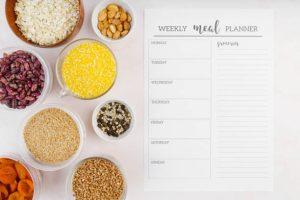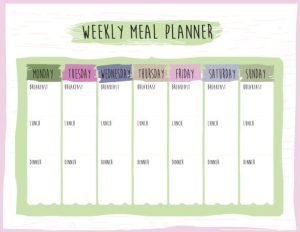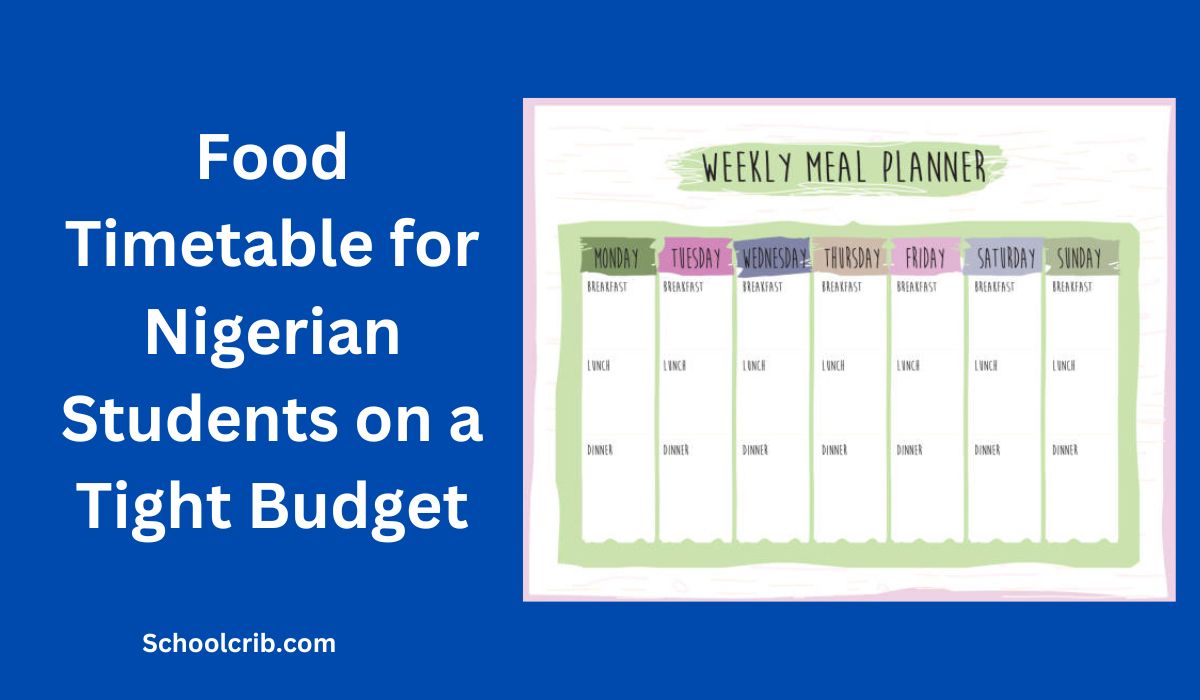If you are searching for a food timetable for Nigerian students on a tight budget, you are in the right place!
I understand that not all students have a lot of money to spend on food.
If you are a student who doesn’t have much money to spend on food but still wants to feed well, I’ve got you covered!
In this comprehensive guide, I will be showing you the food timetable for Nigerian students on a tight budget.
So, you can simply adjust this timetable to suit your personal situation.
Ready? Let’s go!
Also Read: How to Make a Food Timetable As a Student in Nigeria
Food Timetable for Nigerian Students on a Tight Budget

Creating a food timetable for Nigerian students on a tight budget involves planning meals that are both cost-effective and nutritious.
Here’s a sample food timetable:
|
Day |
Breakfast | Lunch | Dinner | Snacks |
| Monday | Oatmeal with banana | Jollof Rice with vegetables | Spaghetti with tomato sauce | Sliced fruits (e.g., apples) |
| Tuesday | Bread and peanut butter/jam | Fried Rice with mixed veggies | Beans and plantain | Nuts or seeds |
| Wednesday | Pap (Ogi) with groundnut | Yam and egg sauce | Vegetable soup with eba/garri | Yogurt or yogurt drink |
| Thursday | Akara (bean cakes) with tea | Moi Moi (steamed bean pudding) | Rice and stew | Carrot sticks with hummus |
| Friday | Cornflakes with milk | Indomie noodles with vegetables | Boiled yam with egg stew | Popcorn or popcorn with spices |
| Saturday | Pancakes with syrup | Jollof Rice with chicken | Fried plantain and egg | Sliced cucumber |
| Sunday | Custard with powdered milk | Fried yam with pepper sauce | Spaghetti with egg sauce | Sliced watermelon |
1. Monday
Breakfast
Start your week with a healthy and budget-friendly meal by having oatmeal with a sliced banana.
Oatmeal is filling and nutritious, and bananas are relatively cheap and a great source of energy.
Lunch
For lunch, you can enjoy Jollof Rice with lots of vegetables.
Jollof Rice is a classic Nigerian dish, and you can stretch it by adding plenty of veggies to make it more nutritious and cost-effective.
Dinner
In the evening, keep it simple with spaghetti and tomato sauce. It’s quick to make and doesn’t require many ingredients.
Snacks
If you get hungry in between, have some sliced fruits like apples.
They’re not only affordable but also healthy.
Recommended: List of Food Provisions for Boarding School in Nigeria
2. Tuesday
Breakfast
Spread peanut butter or jam on bread for an easy and budget-friendly breakfast.
Lunch
Have a satisfying lunch with Fried Rice that includes mixed vegetables.
You can use leftover rice from the previous day.
Dinner
Cook a simple meal of beans and plantain.
Beans are an excellent source of protein, and plantains are usually inexpensive.
Snacks
Munch on some nuts or seeds for a quick energy boost.
3. Wednesday
Breakfast
Enjoy a traditional Nigerian breakfast with pap (ogi) and groundnut.
It’s both comforting and affordable.
Lunch
Opt for yam and egg sauce. Yam is a staple in Nigeria and is usually budget-friendly.
Dinner
Prepare vegetable soup with eba or garri. It’s nutritious and cost-effective.
Snacks: Have some yogurt or a yogurt drink for a tasty and healthy snack.
4. Thursday
Breakfast
Try akara (bean cakes) with tea. It’s a delicious and protein-rich breakfast option.
Lunch
Moi Moi, a steamed bean pudding, is not only budget-friendly but also nutritious.
Dinner
Keep it simple with rice and stew.
You can use leftover rice and pair it with an affordable stew.
Snacks
Snack on carrot sticks with hummus. Carrots are affordable and packed with vitamins.
Also See: 15 Ways to Make Money Online As a Student in Nigeria
5. Friday
Breakfast
Have cornflakes with milk. It’s a quick and easy breakfast option.
Lunch
Indomie noodles with vegetables make for a convenient and budget-friendly lunch.
Dinner
Prepare boiled yam with egg stew. Yam is a staple in Nigeria and is often reasonably priced.
Snacks
Enjoy some popcorn or spice it up with your favorite seasonings.
6. Saturday
Breakfast
Make pancakes with syrup for a delightful start to the weekend.
Lunch
Go for Jollof Rice with chicken for a satisfying meal.
Dinner
Keep it simple with fried plantain and egg. Plantains are usually quite affordable.
Snacks
Slice up some cucumbers for a refreshing snack.
7. Sunday
Breakfast
Have custard with powdered milk. It’s a comforting and budget-friendly choice.
Lunch
Treat yourself to fried yam with pepper sauce. It’s a delicious and cost-effective meal.
Dinner
Make spaghetti with egg sauce for a simple and filling dinner.
Snacks
Wind down your week with some sliced watermelon, a refreshing and budget-friendly snack.
Remember, you can always adjust this timetable based on your preferences and what’s available at your local market.
The key is to prioritize budget-friendly ingredients while maintaining a balanced and nutritious diet.
Also Read: 20 Things to Take to University Hostel in Nigeria
How to Create a Food Timetable As a Nigerian Student on a Tight Budget

Creating a food timetable as a Nigerian student on a tight budget is an essential skill to help you manage your finances while maintaining a healthy diet.
Here’s a step-by-step guide on how to create a practical and budget-friendly food timetable:
1. Assess Your Budget
Start by evaluating your monthly or weekly budget for food.
Determine how much you can afford to spend on groceries and dining out.
2. Set Nutritional Goals
Identify your nutritional needs and dietary preferences.
Ensure your timetable includes a variety of foods to meet your nutritional requirements.
3. Plan Your Meals
Break your day into three main meals: breakfast, lunch, and dinner, and include snacks as needed.
Recommended: List of Food Provisions to Take to University in Nigeria
4. Create a Weekly Menu
Develop a menu for the week.
This will help you plan your grocery shopping more efficiently.
5. Embrace Cost-Effective Staples
Base your meals around budget-friendly staples such as rice, beans, yam, pasta, and vegetables.
These are often more affordable and can be versatile in various dishes.
6. Meal Prep
Consider batch cooking to save time and money.
Prepare larger quantities of meals, portion them out, and store them for future use.
Also See: What Should I Take to University As a Fresher in Nigeria?
7. Use Leftovers
Be creative with leftovers.
Use yesterday’s dinner as a base for today’s lunch or dinner to reduce food waste and save money.
8. Prioritize Seasonal and Local Produce
Purchase fruits and vegetables that are in season and grown locally.
They tend to be fresher and cheaper.
9. Buy in Bulk
Purchase non-perishable items like rice, pasta, and canned goods in bulk to take advantage of discounts and reduce overall costs.
Also Read: Top 12 Cheapest Schools of Nursing in Nigeria
10. Limit Dining Out
While dining out can be convenient, it’s usually more expensive than cooking at home.
Save restaurant visits for special occasions or treat yourself occasionally.
11. Plan for Snacks
Include budget-friendly snacks like fruits, nuts, seeds, or yogurt in your timetable.
These can help curb hunger between meals.
12. Learn Basic Cooking Skills
Developing basic cooking skills can help you prepare tasty and affordable meals at home.
Explore simple recipes and cooking techniques.
Recommended: 10 Best Courses to Study in Colleges of Health Technology in Nigeria
13. Experiment with Vegetarian Meals
Consider incorporating more vegetarian meals into your timetable.
Plant-based options are often more cost-effective than meat.
14. Avoid Excessive Processed Foods
Processed foods can be convenient but are typically more expensive and less nutritious.
Minimize their use and opt for whole, unprocessed ingredients.
15. Stay Organized
Keep track of your meal plan and shopping list to avoid impulse purchases.
This will help you stay within your budget.
16. Stay Flexible
Be prepared to adapt your timetable as needed.
Sometimes unexpected expenses or opportunities arise, so flexibility is key.
Creating a food timetable on a tight budget requires planning, discipline, and some creativity.
By following these steps and prioritizing cost-effective ingredients, you can eat well while keeping your expenses in check as a Nigerian student.
Also See: 20 Best Colleges of Health Technology in Nigeria
Why Should You Plan Your Meals As a Nigerian Student?

Planning your meals as a Nigerian student offers several important benefits.
Here are some compelling reasons why you should consider meal planning:
1. Cost Savings
Meal planning allows you to budget your food expenses effectively.
When you plan your meals, you can make a shopping list, buy in bulk, and avoid impulse purchases, all of which help you save money.
2. Healthier Eating
Planning your meals enables you to make more nutritious choices.
You can incorporate a variety of foods, ensuring you get essential nutrients and avoid excessive consumption of unhealthy items like fast food.
3. Time Efficiency
Knowing what you’re going to cook in advance saves time.
It reduces the stress of figuring out what to make every day, making meal preparation quicker and more efficient.
Also Read: Top 15 Best Medical Courses to Study in Nigeria
4. Reduced Food Waste
When you plan meals, you’re less likely to buy food items that may go to waste.
You can buy ingredients in quantities that you’ll actually use, reducing food spoilage and waste.
5. Balanced Diet
Meal planning helps you create a balanced diet by ensuring you include different food groups.
You can easily track your intake of proteins, carbohydrates, vitamins, and minerals, which is important for overall health.
6. Improved Portion Control
Planning meals allows you to control portion sizes better, preventing overeating and promoting healthier eating habits.
Recommended: 15 Most Useless Courses to Study in Nigeria
7. Enhanced Food Safety
By planning meals, you can pay attention to food safety practices, ensuring that your food is stored, prepared, and cooked safely to avoid foodborne illnesses.
8. Less Stress
Knowing what you’re going to eat in advance reduces the daily stress associated with meal decisions.
It’s particularly helpful during busy times like exams and project deadlines.
9. Cultural Connection
As a Nigerian student, meal planning can help you stay connected to your cultural food traditions.
You can include your favorite Nigerian dishes in your plan, ensuring you enjoy the tastes of home.
Also See: Top 15 Easiest Courses to Study in Nigeria
10. Customization
Meal planning is highly customizable.
You can cater to your dietary preferences, allergies, or dietary restrictions more easily when you plan your meals.
11. Environmental Impact
Reducing food waste through meal planning contributes to environmental sustainability by reducing the carbon footprint associated with food production and disposal.
12. Skill Development
Meal planning encourages you to develop cooking skills, experiment with new recipes, and become more self-sufficient in the kitchen, which is a valuable life skill.
13. Social Opportunities
Planning meals with roommates or friends can be a social activity, encouraging bonding and shared responsibility for meal preparation.
Overall, meal planning as a Nigerian student can have a positive impact on your finances, health, time management, and overall well-being.
It’s a practical and sustainable approach to eating that can help you thrive during your student years and beyond.
Also Read: Top 15 Hardest Courses to Study in Nigeria
Frequently Asked Questions (FAQ)
What Should a Student Eat Every Day?
For a student’s daily diet, aim for balance. Include protein sources like meat, beans, or tofu for muscles.
Go for whole grains like brown rice and oats to fuel your day.
Add fruits and colorful veggies for vitamins and fiber.
Don’t forget dairy or alternatives like yogurt for calcium. Healthy fats from nuts and avocados are good for you.
And, keep hydrated with plenty of water.
Balance and portion control are key for overall health.
So, mix it up, eat a rainbow of foods, and stay mindful of what you put on your plate every day!
What Are Good Foods To Eat As a Nigerian Student?
Are you curious to know the good foods to eat as a Nigerian student?
Well, start with basics like rice, beans, yam, and plantains.
Go for seasonal local veggies to save cash.
Try dishes like Jollof Rice, Veggie Fried Rice, or Beans Porridge for hearty meals.
Moi Moi and Akara provide affordable protein.
For breakfast, enjoy pap (ogi) with groundnut or bread with spreads like peanut butter or jam.
Homemade soups like Egusi or Vegetable Soup with eba or garri are both delicious and healthy.
Keep dining out to a minimum and focus on cooking at home with locally sourced ingredients for a balanced and budget-friendly diet.
What Can I Eat for Dinner As a Nigerian Student?
As a Nigerian student, your dinner options on a budget are quite diverse.
Think about basics like rice, beans, yam, or pasta.
Whip up Jollof Rice or Fried Rice with lots of veggies for a delicious meal.
Beans Porridge with plantains is hearty and cost-effective.
Try traditional soups like Egusi with fufu or Vegetable Soup with eba or garri.
If you’re in a hurry, make Spaghetti with tomato sauce or stew.
Just keep it simple and homemade to save money.
Use local ingredients like veggies and spices to enjoy flavorful Nigerian dishes without breaking the bank.
What Can I Cook on a Low Budget in Nigeria?
In Nigeria, you can cook tasty, budget-friendly meals. Start with staples like rice, beans, yam, and plantains.
Local veggies are wallet-friendly. Try Jollof Rice, Veggie Fried Rice, or Beans Porridge for filling options.
Moi Moi and Akara provide affordable protein.
For breakfast, go for pap (ogi) with groundnut or bread with peanut butter or jam.
Cook at home to save, and limit dining out.
With creativity and local ingredients, you can savor delicious, cost-effective Nigerian dishes.
How Do You Arrange a Food Timetable?
Arranging a food timetable is easy. Begin by evaluating your budget and nutritional needs.
Plan three meals and snacks daily. Choose affordable staples like rice and vegetables.
Create a weekly menu to streamline shopping. Opt for seasonal and local produce and buy in bulk when possible.
Limit eating out to save money. Cook at home, try more vegetarian options, and avoid processed foods.
Stay organized with a meal plan and shopping list. Flexibility is essential, allowing for adjustments.
This approach helps you save money, eat healthier, and manage your time effectively, benefiting both your budget and well-being.
Recommended: Why Do High School Relationships Fail?
Conclusion
Some people actually think that healthy feeding is expensive but in reality, unhealthy feeding costs more money.
Instead of spending money on unnecessary snacks and junk, why not use that money to prepare a pot of food for yourself at home?
Trust me; it is more cost-effective and nutritional.
In this article, I’ve shown you the food timetable for Nigerian students on a tight budget.
Kindly adjust this timetable to fit into your budget and personal circumstances.
If you have any inquiries or questions, remember to drop them in the comments section and I will attend to them ASAP.
Good luck!
Related Posts:
- What to Wear to a High School Reunion
- How Many Clubs Should I Join in High School?
- How Long Is a High School Graduation?
- How Long Do High School Relationships Last?
- Are There Ivy League Schools in California?
- What Is Creative Writing in High School? (Fully Explained)
- 15 Best Online Jobs for High School Students
- Can You Go Back to High School After Dropping Out?
- What Happens If You Fail a Class in High School?
- How Long Does It Take to Get a Counseling Degree?
